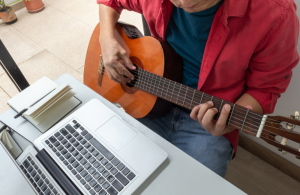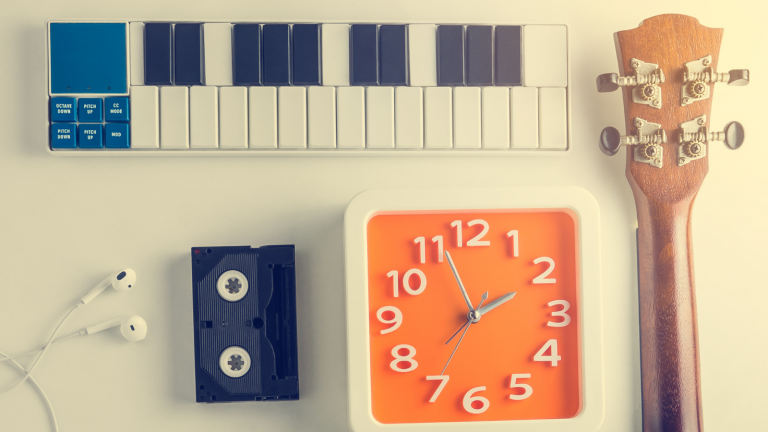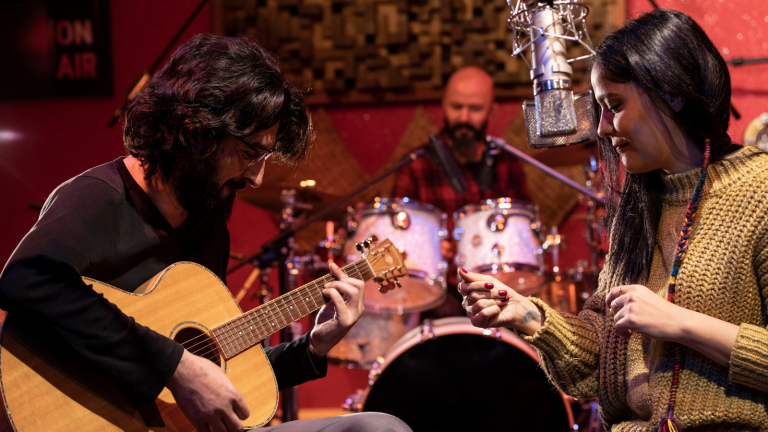
11 Best Online Guitar Courses Reviewed And Compared
What are the best online guitar courses? And how they can help you to learn the guitar? Read all you need to know about online guitar lessons and learning the guitar on your own.

You know that learning music, like learning whatever else, takes time, and usually more time than you think in the beginning. That’s why many people are discouraged because they expected it will be easier and faster. When you learn to play the guitar, piano, drums, violin, or another instrument, you know what I’m talking about. Even if you try, sometimes It is not easy to keep your motivation up. Due to this fact, many people quit after a few months or years. That’s why I would like to give you 7 tips on how to stay motivated to practice your instrument.
Read also: 7 Steps To Find The Best Online Music Course
The first thing you should know that this fluctuation in the learning progress is normal , and you are not alone. I play the piano for 30 years, guitar for around 20, and during this period I had many doubts, and drop-outs, I finished and then started again. But finally, I always found some way how and why to continue with making and learning music.
So, when you feel depressed because of slow progress, or you have the feeling like you don’t have a talent, I hope these tips will help.
I’m gonna start with the most powerful tip, that can totally change your relationship with music. I know this works very well because of my experiences, and the experiences of many other musicians. So my first tip is: If you need to strengthen your motivation for learning a musical instrument, start to play with others.
I deliberately started with this tip, because it can do miracles. I think music is a social being, it is a social creature, and it needs to be shared. When you play just for yourself at home for many years, your pleasure from music can go down. I mean, playing for yourself can be great therapy, but it is not enough. Once you start to play with other musicians, magic happens.
This tip is not obviously for beginners, because when you are a newbie, nobody wants to play with you right? But when you already have some background, for example, you know how to play guitar accompaniment, you know how to play chords and keep the rhythm, you can suggest to your friends let’s play together.
It doesn’t matter what musical style you prefer. For example, you are an intermediate pianist who likes playing a classical repertoire. So try to find some violinist, cellist, or a singer and play classical duos and trios together. Why not?
Or you are a drummer who likes heavy metal, if you know some metal guitarist and bass player from your place, try to play with them!
Maybe you are asking, why should I do this? Well, because when you start to play with others, you will see music from a different angle, and it won’t be anymore only your private activity, but it changes into a social activity. When playing in a band, or a musical group, you can learn many new things, and gain new skills very naturally, because you even don’t know you are learning. So this was my tip number 1 and let’s move to tip number 2 which is:

Well, this is nothing new right? Anyway, I’m talking about this, because many musicians don’t have a practice routine. It seems to be more effective when you have set days and time for practicing a musical instrument. Once you get used to exercise regularly, it is much easier to come through periods of decreased motivation.
Learning an instrument is not only about having fun. Sometimes it is a hard work, it can be boring and annoying. So let’s say you practice every Sunday, Tuesday, and Friday for 2 hours. Or you practice 40 minutes every day. It depends on you, your time, how you set the routine.
The goal is to create a practice habit. It requires some level of self-discipline, of course, but without effort, you won’t make any progress.
Some people can speak in 6-7 languages fluently. We call them polyglots. Many of them have their “secret weapons” or some methods they use when learning a new language. One of them is usable for us as well. What polyglots do is that they surround themself with things related to the language they learn. What does this mean for us? We can do the same and surround ourselves with things related to music, or a musical instrument we learn. We can also spent more time with some musical activities. Just a few examples:
All these things can help to deepen your relationship with music and the musical instrument you play.
It is difficult to learn something if you don’t know why you should do it. Ask yourself: What do I want to reach? What are my goals? And I’m not talking now about goals like: “I want to play in front of a hundred thousand people with my band“. I mean it can be a goal, but try to keep it real. I give you a few examples:
Well, this sounds like a goal. The point of this method is kind of a project-thinking about learning a musical instrument. When you set realistic goals, and you meet them, it will give you confidence. Than you can handle even more difficult things. And it is very motivating!
On the other hand, having no goals can put you in a situation, you are repeating the same songs, playing the same staff, and doing the same mistakes. And nobody wants this. So my tip number 4 is: Set goals you can manage.
I don’t know how you learn to play a musical instrument. Maybe you took some private lessons, go to a music school, or you learn at home using some online music courses, or you learn on your own. But if the way how you learn music doesn’t motivate you enough, try to change it!
If you learn by yourself just by watching youtube videos or using some books, it can work only in case you know exactly what and how to learn. When you are a beginner, you have no idea what to learn and in which order, so I think this way of learning is the worst.
If you are in this situation, I recommend to take private lessons, find an online teacher, or try online courses. On www.bestmusiccourses.com website you can find several online lessons from different producers. Under Online Music Courses category in the main menu, you can discover new interesting sources of learning. At least, you might find there some inspiration.
So the tip number.5 is: If the way you learn music doesn’t motivate you enough, change it!
Choose your category and browse online music courses for your instrument.
This tip doesn’t apply to everybody. I conclude it here because music production can be very motivating. I have studied music composition at Conservatory because this part of music activity is for me the most interesting and motivating for me. I think it can also help people who are stuck somewhere in the process of learning a musical instrument. Except for creating your songs, and compositions, you can also try to record them.
Once you start liking composing music, it is very difficult to stop. It forced you to study new things about music and practice the instrument because you want to be able to record and compose more and more challenging things. So my recommendation for those who feel a problem with motivation while learning a musical instrument is: Try to compose your music.
The last tip I can give to people who feel bored and discouraged by learning a musical instrument is actually not motivating at all. And it sounds…
Yes, exactly! If you learn to play a musical instrument for a long time, let’s say months or years, and you don’t feel the energy to continue, stop it! There is nothing wrong about it! Especially when you already have tried some of these methods I was talking about before. When you tried to practice and play, but it brought you more stress than relief and fun, stop it! Not everyone has to be a musician!
You can do so many things, somebody likes sport, playing football, running, skiing, or riding a horse, or collecting mugs, reading books, wood carving, extreme ironing (yes, this really exists:). There are so many things you can do! So if you put enough time, effort, and energy into playing the ukulele, piano, bass guitar, or whatever instrument you play, you can say: I’m done. I want to do something else.
What I want to say is, that when you reach some point, when you don’t like learning music anymore, why you should continue? It doesn’t make sense.
So this was my last tip on how to stay motivated to practice a musical instrument. I hope, this article gave you something. At least some ideas to think about. Learning a musical instrument is a great activity, but sometimes it can be boring. I think, that people who really like music, and love playing a musical instrument, will somehow find their ways on how to overcome these bad days or demotivating periods.
Thanks for reading this article! I would appreciate it if you tell me your recipes for staying motivated when playing an instrument. Just put your ideas in the comment section below. Cheers!
Do you like this content? Share it with your friends!

What are the best online guitar courses? And how they can help you to learn the guitar? Read all you need to know about online guitar lessons and learning the guitar on your own.

Do you mind the slow progress with your musical instrument? Is the energy missing to continue? Read 7 tips on how to stay motivated to learn a musical instrument.